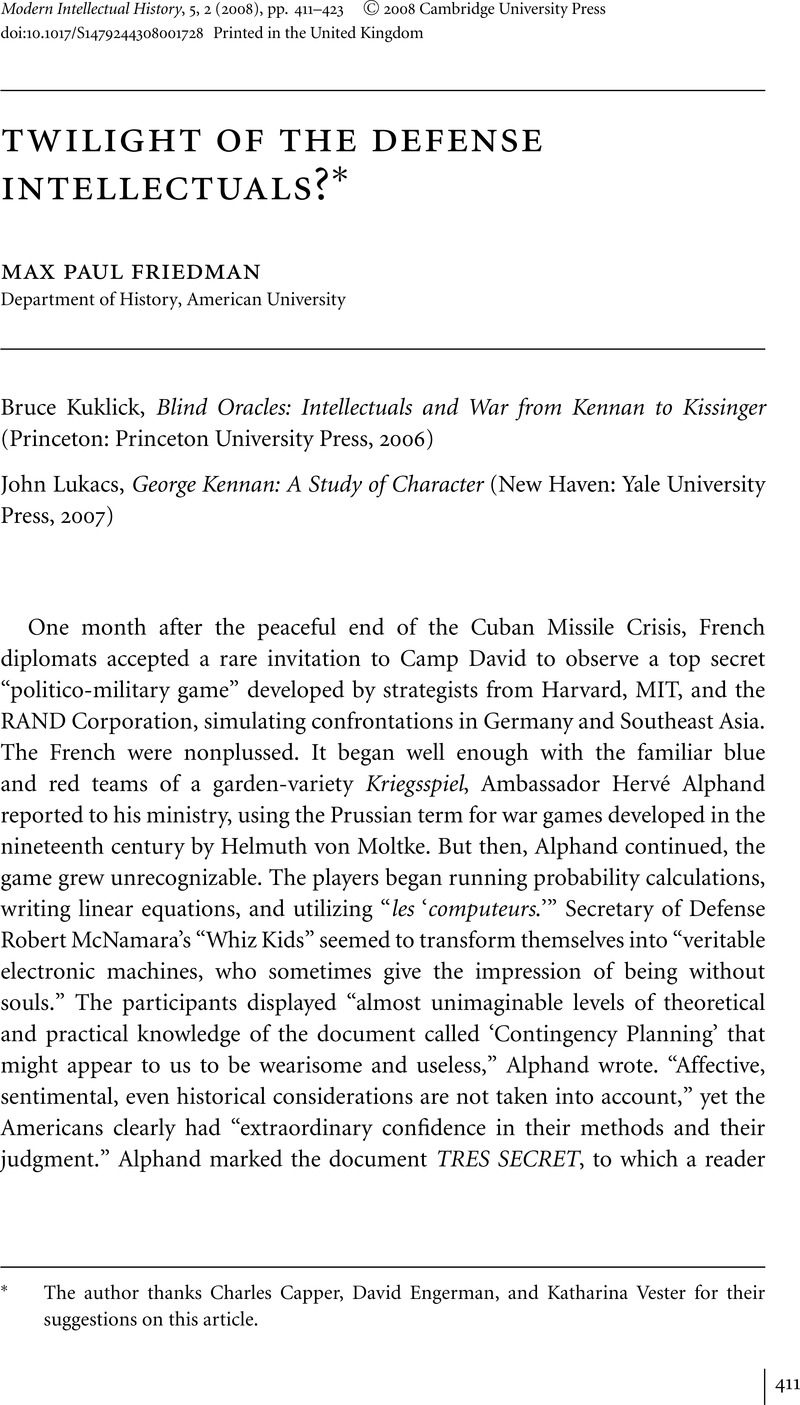No CrossRef data available.
Article contents
TWILIGHT OF THE DEFENSE INTELLECTUALS?*
Published online by Cambridge University Press: 01 August 2008
Abstract

- Type
- Review Essays
- Information
- Copyright
- Copyright © Cambridge University Press 2008
References
1 Hervé Alphand to Maurice Couve de Murville, 25 Jan. 1963, sous-série Etats-Unis 1952–1963, No. 376, série Amérique, Ministère des Affaires Etrangères, Paris.
2 Robin, Ron, The Making of the Cold War Enemy: Culture and Politics in the Military–Intellectual Complex (Princeton: Princeton University Press, 2003)Google Scholar.
3 Hammarlund, Per A., Liberal Internationalism and the Decline of the State: The Thought of Richard Cobden, David Mitrany, and Kenichi Ohmae (New York: Palgrave Macmillan, 2005)CrossRefGoogle Scholar; Kant, Immanuel, Zum ewigen Frieden. Ein philosophischer Entwurf (Königsberg: Friedrich Nicolovius, 1795)Google Scholar.
4 Duchêne, François, Jean Monnet: The First Statesman of Interdependence (New York: Norton, 1994)Google Scholar.
5 Dower, John W., War without Mercy: Race and Power in the Pacific War (New York: Pantheon, 1986)Google Scholar.
6 Engerman, David, “Rethinking Cold War Universities: Some Recent Histories,” Journal of Cold War Studies 5 (2003), 80–95CrossRefGoogle Scholar.
7 Wildavsky, Aaron, “Practical Consequences of the Theoretical Study of Defense Policy,” Public Administration Review 25/1 (March 1965), 90–103CrossRefGoogle Scholar.
8 Cohn, Carol, “Sex and Death in the Rational World of Defense Intellectuals,” Signs 12/4 (1987), 687–718CrossRefGoogle Scholar.
9 Khong, Yuen Foong, Analogies at War: Korea, Munich, Dien Bien Phu and the Vietnam Decisions of 1965 (Princeton: Princeton University Press, 1992)Google Scholar.
10 Fursenko, Aleksandr and Naftali, Timothy J., “One Hell of a Gamble”: Khrushchev, Castro, and Kennedy, 1958–1964 (New York: Norton, 1997)Google Scholar; Nash, Philip, The Other Missiles of October: Eisenhower, Kennedy, and the Jupiters, 1957–1963 (Chapel Hill: University of North Carolina Press, 1997)Google Scholar.
11 President George W. Bush similarly invoked the conventional “lesson” of the Cuban Missile Crisis in 2002 when explaining the importance of confronting Saddam Hussein with military force to assure Iraq's disarmament.
12 Memorandum for the Chairman, NSC Working Group on Southeast Asia, from Mustin, L. M., JCS Staff with Comments on the draft for Part II, “US Objectives and Stakes in South Vietnam and Southeast Asia,” 10 Nov. 1964, reproduced in The Pentagon Papers, Gravel Edition, 5 vols. (Boston: Beacon Press, 1971–2), 3: 621–8Google Scholar.
13 Cohn, “Sex and Death.”
14 Gardner, Lloyd C., Pay any Price: Lyndon Johnson and the Wars for Vietnam (Chicago: Ivan R. Dee, 1995)Google Scholar.
15 Cahn, Anne, Killing Détente: The Right Attacks the CIA (University Park: Penn State University Press, 1998)Google Scholar.
16 “‘Unceasing Pressure for Penetration’: Gender, Pathology, and Emotion in George Kennan's Formation of the Cold War,” Journal of American History 83/4 (March 1997), 1309–39.
17 Logevall, Fredrik, Choosing War: The Lost Chance for Peace and the Escalation of War in Vietnam (Berkeley and Los Angeles: University of California Press, 1999)Google Scholar.
18 Steel, Ronald, Walter Lippmann and the American Century (New York: Little, Brown, 1980)Google Scholar; Woods, Randall Bennett, J. William Fulbright, Vietnam, and the Search for a Cold War Foreign Policy (New York: Cambridge University Press, 1998)CrossRefGoogle Scholar; Fall, B., The Two Viet-Nams (New York: Praeger, 1966)Google Scholar; Chomsky, N., American Power and the New Mandarins (New York: Pantheon, 1969)Google Scholar. Hans Morgenthau, H. Stuart Hughes and thousands of other academics signed a petition to the Johnson administration calling for the neutralization of Vietnam to avoid a wider war. “5,000 Scholars Ask a Neutral Vietnam,” New York Times, 11 July 1964, 1. For a recent overview of alternative traditions in foreign policy see Mayers, David, Dissenting Voices in America's Rise to Power (New York: Cambridge University Press, 2007)CrossRefGoogle Scholar.




